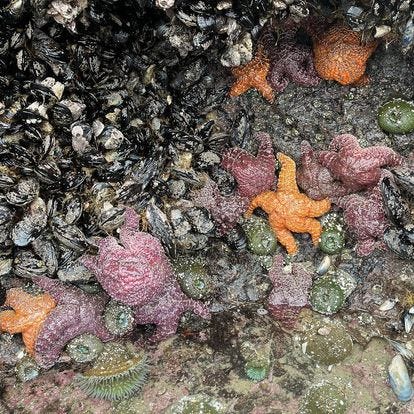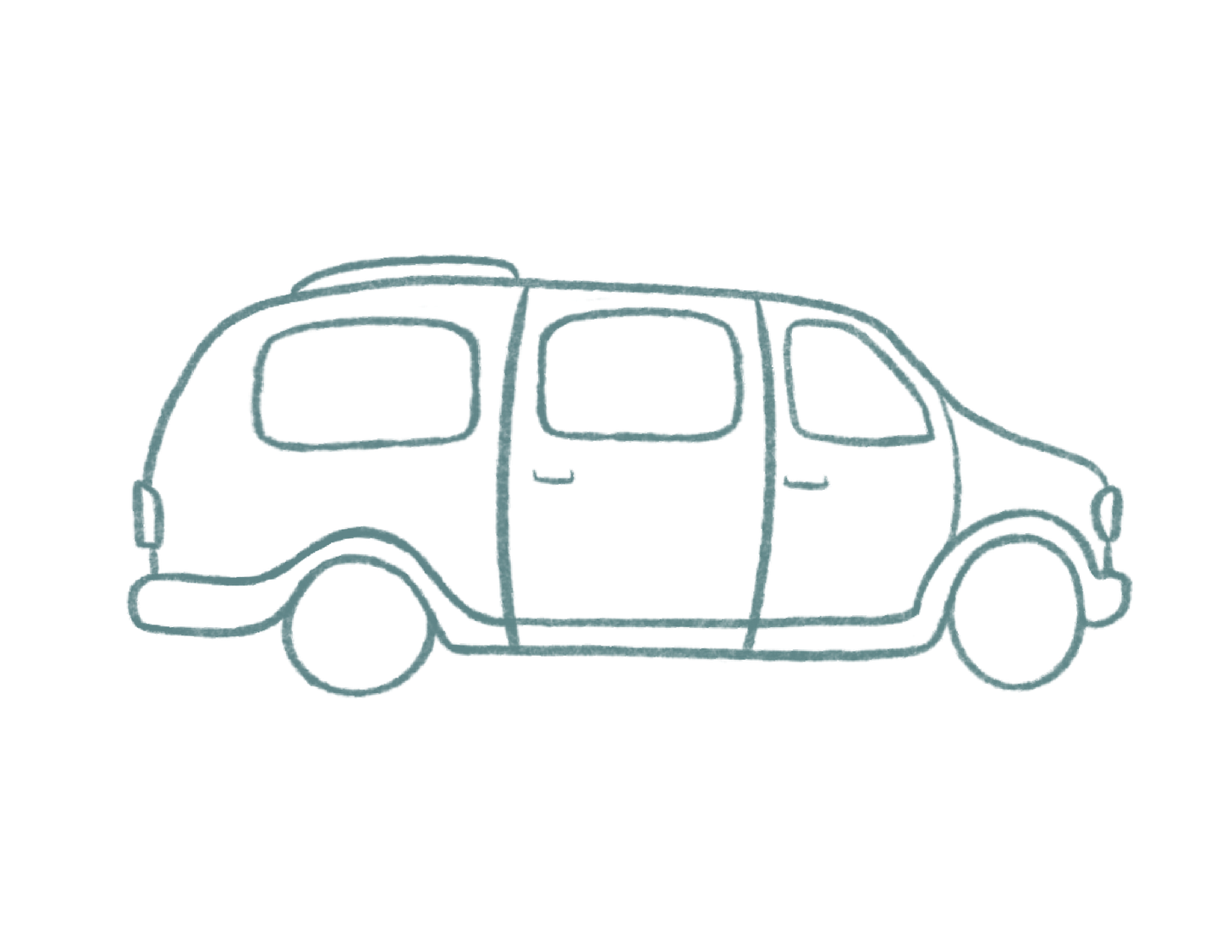
Their voices over the surf are barely audible. But their enthusiasm, like the magic here, is palpable. So, I’m about to be shocked when his question breaks the spell. For now, she hovers precariously over a tide pool, camera poised just above water’s edge. He hops awkwardly, gleefully from rock to rock, unwittingly revealing the eleven-year-old still alive in his middle-aged body.
“We’re from the mountains.” He beams as I get closer. “We go crazy over this stuff. There’re three big starfish in that pool.” He points before I can respond, eyes dancing with wonderment. “And there’s a purple one over there. And that, right there, is a great spot for a picture. You can see all the way through.” He gestures to a long, oval gap in a craggy rock outcropping like a magical doorway to the endless ocean.
Earlier, I saw another couple sunning on the beach, grandparents filming a child frolicking in the sudsy surf, a lone straggler or two. Now, we’re the only ones who remain, having ventured down the blackberry-brambled path to this intertidal stretch just outside Crescent City.
When he asks where I live, I simply say, “Santa Barbara.” The city fits better into people’s understanding of home than does, “My van.” (And only a few weeks on the road, I still sublease an apartment there.) They live in nearby Grants Pass. I appreciate the friendliness but am glad when they head back along the beach toward the trail.
He calls parting words I can’t quite make out. I understand it’s about Santa Barbara—about something “bad” from the expression on his face when I look back. I assume he’s asking about recent fires or the resulting mudslides that took twenty-one lives last winter and respond accordingly, prepared to accept his sympathy on behalf of my neighbors.
He shakes his head and raises his voice to be heard over the crash of the waves and seabirds’ long, unabashed caaaaws. “You gettin’ overrun with immigrants down there?”
His words revise his features into what I see as a sneer. I’m taken aback. Does the whiteness of my skin alone tell him this leeway might be OK? Is he hoping for a last moment of camaraderie before we part ways? Oh, how we love the beautiful tide creatures; oh, how we bemoan the deplorable brown people?
Microbursts of emotions—disgust, confusion, sorrow, anger, fear, hopelessness—pierce the belly-full-of-berries haze I’d been basking in.
“No,” I say and turn my back.
Prone in the back of the van that night, watching the stars through my barn door window, I test a handful of responses—like flipping through a series of photos.
“You know what we thankfully don’t have overrunning us? Racist, ignorant rednecks.”
“Why would you say that? What are your concerns related to immigration?”
“Is this the punchline from a joke that starts with, What did the indigenous people of every place on earth colonized by people who look like you and me say to each other?”
“Where did your people immigrate from?”
None of them is satisfying.
How could I distill it? The gratitude I feel to live in a community enriched by many who were not born in the United States. The way I am broadened, made blissfully more open and infinitely fuller to have among my dear ones roots—aka wisdom, perspective, genetic memory—spread across a wide swath of our small shared home, the globe. That I thus feel more profoundly plugged in to what I envision as the structure, mycelial and invisible, that connects us all.
***
Among the vast array of beings that make up us, those who reside in tide pools are a hearty bunch. An abundant kaleidoscope of life and color—anemones, mussels, urchins, snails, crustaceans, barnacles, seaweed, small fish—they endure. Side by side in the tiny basins that are their worlds, for hours during low tide, they deal with decreased oxygen and rising temperatures, all the while exposed to predators, mostly of the avian variety, and the sun’s rays. And when the tide finally comes, bathing them once more in fresh seawater, it brings, too, crashing waves and fish that have waited for this opportunity to forage so close to the shoreline. So, what can the residents do but cling to whatever rock is nearby?
***
Is there an answer, I wonder, I could have given the man at the beach to capture how I am crushed by his sentiment? To explain that it makes me feel small and useless, battered by waves too huge to fathom? I don’t want the text hotline a local activist group has set up to alert my neighbors of ICE action to be necessary. I don’t want the ad hoc immigration support organization I briefly volunteered with to be someone’s only rock to cling to. I don’t want children, or anyone for that matter, to be caged at the border of the country I call mine simply by virtue of something I had absolutely nothing to do with—being born. I don’t want to examine how minute any effort or concern on my part is amid the ocean of complexities that, when distilled, comes down to people trying to breathe the air we share and give themselves and their children opportunities.
What if he could glimpse the fear in the eyes of the woman trying to decide who to list as the caretaker of her elementary age children, born here, so they won’t be lost from her or worse, were she to be ejected from the only home they’ve known? If he could see the pain as she finally chose the eighteen-year-old, who would have to come home from college? If he could witness the whiteness of her knuckles clinging to so many eight-by-twelve pages meant to barricade against the whims of a government with coffers to fill and empty and men and women wearing Kevlar and sidearms to deploy? What if the eleven-year-old inside him could see all that?
What if I could show him the lives touched by my Colombian, Ecuadorian, Venezuelan, Lebanese, Argentinian, French, Spanish, Dutch, Peruvian, Guatemalan, Mexican, South African, Portuguese, Iranian friend family? The ballrooms-full of hips learning to sway to Latin beats, forging bonds across ages and backgrounds thanks to a former monk from Argentina? The countless legs pedaling safely to school or work or the beach thanks to a woman who came as an au pair and became a cycling educator and advocate? The knees of incarcerated men joining in circle as they’re supported to look inward and lead, the work of a friend born in Lebanon? The throats of young people opening to use once silenced voices, encouraged by the talent and warmth of a Colombian songstress? The Spanish hands, wrapped in boxing tape, exemplifying how to move forward gracefully after loss?
The “glue” that enables barnacles to thrive in the rugged environment of their tide pool worlds is so uniquely strong, so fast-curing researchers have long attempted to harvest it or reproduce it commercially.
And the nutrients in these tiny worlds are plenteous, ever replenished by the ebb and flow that is their rhythm, and ours. Plankton and other microscopic organisms rush in, nourishing the diverse intricate food chain. And these microworlds thrive. Magenta, lime, crimson tentacles undulate in the kiss of the sun. Granular, pebbled eggplant or tangerine star arms, each with an eye on the end that can detect light, curl to meet the curve of the pool bed’s topography. Inky cadmium urchins spread their spines.
It will dawn on me years later, when I catch myself cringing at memes posted by acquaintances or dear ones, when it can seem we’re no longer even swimming in the same sea—there’s another question: What could I say that would help me not categorize this man on the beach (like I assume he does “immigrants”) as “other”? What would help me see the eleven-year-old boy, wide-eyed with wonder, rather than someone I want to dismiss outright, along with others whose perceptions I believe lead to policies ripping loose the fabric of the connections that bind us all, human and otherwise?
How else will we ever integrate the simple truth? We are all immigrants here, wherever we are, whatever places our ancestors have journeyed from that we don’t remember, whatever bits of soil and stardust we once were. We are all uncertain. We are all striving. We are all.
If I could rewind back to that beach, I would want to say. “Yes! And I am so deeply grateful. Can I tell you about them?”






Love the tide pool comparison and your beautiful images
Love it!